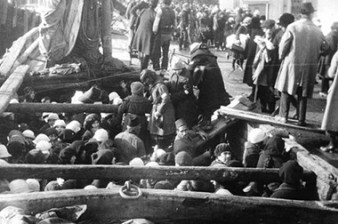
28/04/2015 10:17
Global Centre for the Responsibility to Protect urges governments to commemorate Armenia's tragedy by recognizing the crime
The Global Centre for the Responsibility to Protect issued the following statement on April 24, which marked the centennial of the Armenian Genocide:
"Today marks the centennial commemoration of the Armenian genocide. The Global Centre for the Responsibility to Protect stands with the Armenianpeople, human rights organizations from around the world and many governments in recognizing that the acts that took place 100 years ago in the Ottoman Empire were not just a tragedy but also a crime.
Following a process initiated by the government of the Ottoman Empire on 24 April 1915, hundreds of thousands of Armenians were killed during mass deportations, their homes and property pillaged and seized, and thousands of women were abducted and endured forcible religious conversion. These acts claimed over one million Armenian lives and led the United Kingdom, France and Russia in May 1915 to accuse the Ottoman Empire of committing "crimes against humanity," the first time the term was used in attempting to understand modern atrocities. The systematic attempt to destroy the Armenian people was a genocide as defined under the 1948 UN Convention on the Prevention and Punishment of the Crime of Genocide, and should be officially recognized as such.
While the world has generally acknowledged the Armenian genocide, including His Holiness Pope Francis in a widely publicized 12 April statement, some still continue to deny the historical reality of what happened in 1915. But recognition of the past is not only critical to the normalization of diplomatic relations between Armenia and Turkey, it is also crucial to our collective understanding of how the international community should uphold its responsibility to protect vulnerable and persecuted populations today. Denial of past injustices undermines the prevention of future mass atrocities.
The Global Centre for the Responsibility to Protect urges all governments and the UN General Assembly to commemorate Armenia's tragedy by recognizing the crime. We also urge the UN to designate 9 December as an annual International Day of Remembrance for the Victims of Genocide, in keeping with recent resolutions of the Human Rights Council and European Parliament.
Above all else, we call on the international community to reinvigorate efforts to end the civil war in Syria, where many descendants of the Armenian survivors of 1915 remain trapped between the mass atrocity crimes of the Syrian government and those of some of its armed opponents. We cannot change the painful reality of past crimes, but in keeping with the historic adoption of the principle of the Responsibility to Protect at the UN World Summit ten years ago, the international community can and should do more to end the commission of atrocities today."








